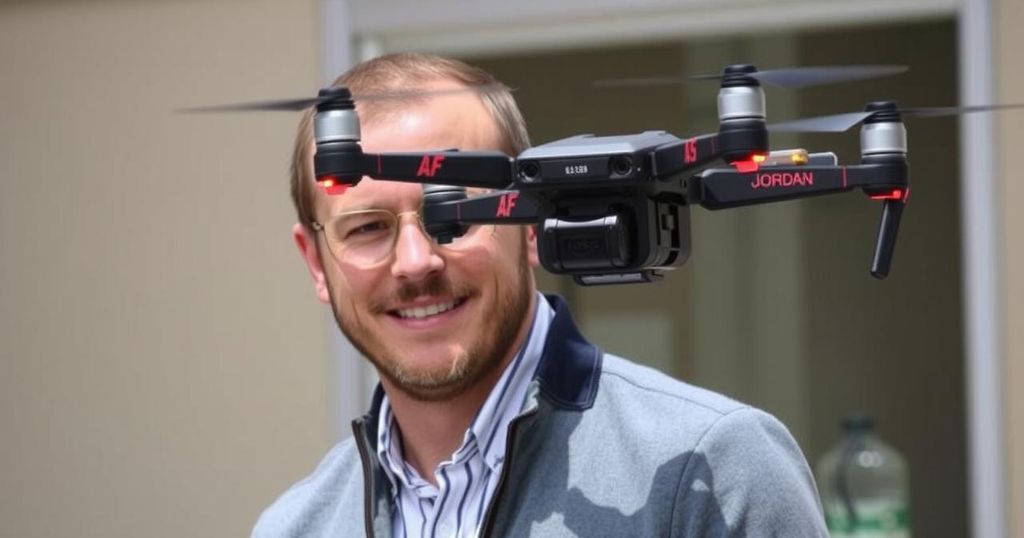Madi Mohammad Sadeghi of Natick has pleaded not guilty to charges of conspiracy to illegally transfer U.S. technology to Iran, resulting in a drone attack that killed three U.S. soldiers. He will remain detained without bail as further hearings are scheduled for January and February.
A 42-year-old man from Natick, Massachusetts, named Madi Mohammad Sadeghi, has pleaded not guilty to conspiracy charges regarding the illicit transfer of sensitive U.S. technology to Iran, which was reportedly utilized in a deadly drone strike targeting U.S. soldiers in Jordan. The arraignment took place at the U.S. District Court in Boston, where Sadeghi faces four counts under the International Emergency Economic Powers Act and associated Iranian sanctions regulations. Following his arraignment, Sadeghi will remain in custody without bail for at least one more week, pending a rescheduled detention hearing set for January 2, and a status conference on February 12.
Federal officials assert that Sadeghi conspired with Mohammad Abedini since 2016 to facilitate the illegal dissemination of advanced technology, including components for unmanned drones, to entities in Iran. Authorities further indicate that Abedini heads a firm in Iran with connections to terrorist activities. The drone technology implicated in the charges was reportedly involved in a January 28 strike on a U.S. military installation in Jordan, which resulted in the tragic deaths of three U.S. Army personnel and injuries to 47 others. Investigators have traced components from the downed drone back to Abedini’s company in Iran. Both individuals were arrested on December 16, with Sadeghi detained in Natick and Abedini apprehended in Milan, Italy, from where he is expected to be extradited to the United States.
The circumstances surrounding the case highlight the growing concerns regarding the unlawful transfer of military technology and its implications for national security. These allegations underscore the significant dangers posed by such technology being acquired by hostile actors, particularly in light of its application in attacks against U.S. forces abroad. The outcome of the upcoming hearings will determine the immediate legal status of Sadeghi and the progress of extraditing Abedini to face charges in the United States. Authorities remain vigilant regarding the links between international technology transfers and potential threats to American lives and interests.
The allegations against Sadeghi arise from serious implications, reflecting broader issues of national security concerning the proliferation of military capabilities to adversarial nations. The case has been closely monitored by federal agencies, indicating the high priority given to addressing and thwarting similar illicit activities. It serves as a reminder of the critical need for robust regulatory measures to prevent sensitive technology from falling into the hands of entities engaged in hostile acts.
Given the gravity of the situation, federal authorities continue to investigate the extent of the conspiracy while emphasizing the importance of safeguarding national defense technologies. The legal proceedings are expected to attract further attention as they unfold, providing crucial insights into the challenges of regulating advanced technology in relation to international security.
The case involving Madi Mohammad Sadeghi addresses serious allegations of conspiracy to transfer sensitive American military technology to foreign entities, specifically to Iranian interests reportedly tied to terrorism. The drone attack on U.S. soldiers resulting from this alleged conspiracy highlights the risks associated with the misappropriation of military technology. This incident underscores vital concerns regarding national security and the protection of American service members from foreign aggressions facilitated by illegal technology transfers. Regulatory compliance regarding technology exports is paramount in preventing such dangerous scenarios.
In conclusion, Madi Mohammad Sadeghi’s not guilty plea to charges of conspiracy related to the illegal transfer of U.S. technology highlights significant national security concerns. The subsequent drone attack in Jordan that resulted in U.S. military casualties emphasizes the severe implications these allegations carry. As the legal proceedings progress, the case may shed light on the broader issue of technology security and international regulatory adherence, reflecting the urgent need for vigilance against threats to national safety.
Original Source: www.metrowestdailynews.com






